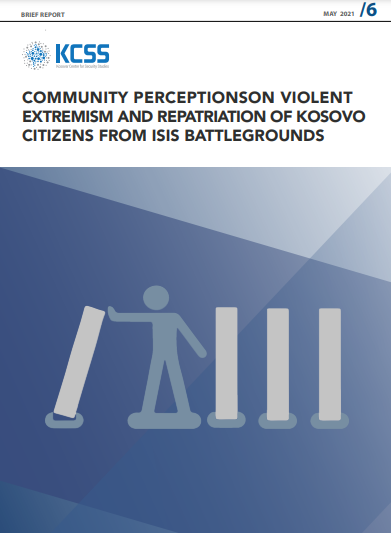25/05/2021

Kosovar Centre for Security Studies (KCSS)
Embassy of the Kingdom of the Netherlands in Prishtina
Skender Perteshi & Shpat Balaj
This report provides an overview of Kosovo citizens’ perceptions on violent extremism. The report specifically focuses on their views on the repatriation of Kosovo citizens from the battlegrounds of the Islamic State in Syria and Iraq, as well as the citizens’ perception on the efforts of institutions and CSOs in regard to the reintegration and rehabilitation of the returnees and their families. The report, presenting both qualitative and quantitative analyses, provides first-hand insights gathered on the ground through extensive research of KCSS. The key data that shape the qualitative aspect of the report derive from the discussions with local communities in eight municipalities of Kosovo, organized by KCSS within the project Building Resilience: Communities against Violent Extremism. On the other hand, the quantitative results derive from the Kosovo Security Barometer (KSB), a KCSS program that measures public opinion on various security issues.
Some 403 Kosovo citizens have joined the Islamic State and other terrorist organizations allegedly to establish the “Islamic Caliphate” in Syria and Iraq. Since 2012, some 250 are returned or repatriated from conflict zones and are currently undergoing rehabilitation and resocialization programs, implemented by Kosovo institutions and local civil society organizations. This brief report was inspired by the recent scholarly research and policies into the reintegration and rehabilitation of foreign fighters and their family members associated with the Islamic State and similar terrorist organizations, which argues that families of the returnees and community in general are essential in the successful rehabilitation of returnees from conflict zones. KCSS set to test this hypothesis by seeking to understand the community’s response to foreign fighters and their families who spent several years in IS-controlled areas or prison camps among IS recruits and their supporters. Our data gathered across Kosovo, both in affected and unaffected areas show that the public is reluctant and resistant to the return of the former terrorist fighters (FFs) in its midst, but they are significantly more open to receiving repatriated women and children back into their respective communities. Despite the establishment of rehabilitation and reintegration programs in Kosovo, Kosovo citizens remain skeptical about the country’s capacity to carry out such programs successfully, potentially undermining any institutional efforts aimed at addressing this vulnerability. As this brief demonstrates, Kosovo’s public remains largely uninformed and insecure about the ongoing efforts to address violent extremism and its consequences in Kosovo. Further, the brief’s initial glaring finding is that transparency and communication about reintegration programs remains crucial should an attitudinal change in the society at large be required. On a general note, this report shows that Kosovo citizens remain alert and perceive different types of violent extremism as a continuous threat to country’s national security.
The insights presented in this report are a summary of information gathered from field activities of KCSS and “Kosovo Security Barometer” survey respondents. The findings demonstrate how citizens percept or are informed about the issues presented in this report. As such, the views presented in this report do not necessarily represent the views of the Kosovar Centre for Security Studies or the Embassy of the Kingdom of Netherlands in Kosovo.
This project is supported by the Embassy of the Kingdom of the Netherlands in Kosovo.